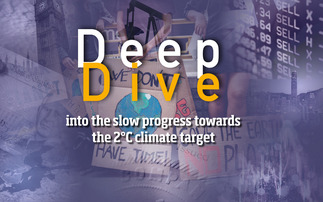
In our 2020 release, we demonstrated that governance and social factors were a statistically meaningful driver of shareholder returns. [1] The pandemic cemented the importance of social impact, with more socially responsible companies tending to outperform[2]. Previously there was weak evidence that environmental factors had similar properties, but the historic relationship was volatile and did not reach the necessary hurdle to be considered significant. That has changed over the last two years, with environmental factors performing on a par with social and governance. This confirms that across the environmental, social and governance pillars, the link between ESG and performance is clearly in evidence.
The non-linear shape of ESG
In our inaugural ESG research, published in 2014, we demonstrated a striking aspect of the relationship between governance and shareholder returns, often overlooked in other studies. Namely, the relationship is non-linear. Companies with leading or improving corporate governance scores outperform peers with poor or worsening standards. However rather than performance deriving from the leaders outperforming, the governance premium is largely driven by the underperformance of the laggards. This same pattern exists for the social factor and for the environmental factor. For investors, avoiding the ESG laggards, and those whose standards are slipping, is a crucial way to capture the ESG premium.
Figure 1. Companies with poor ESG practices have historically underperformed over the long term
Average monthly total relative returns of companies in each quintile, based on environmental, social and governance scores, from 31 December, 2008, to 30 June, 2022. Figures are calculated using constituents of the MSCI World Index, assuming monthly rebalancing. For illustrative purposes only.
Source: MSCI, Federated Hermes, as at 30 June 2022.
A worrying exception
The findings are surprisingly consistent across economic sectors, with the notable exceptions of Real Estate and Energy. Within these sectors, the companies with the worst or worsening environmental practices relative to peers have tended to outperform. For the Energy sector in particular, this result is concerning, if sadly not surprising. Some investors simply avoid the entire sector in the name of environmental considerations. Does this exclusion by many sustainable investors result in the sector being more influenced by those less concerned by sustainability? If sustainability-focused investors are not acting as stewards of the Energy sector, it may be asked, who is?
Figure 2. Notable exceptions: Real Estate and Energy break the pattern of environmental outperformance
Average monthly dispersion in total returns between companies in the top quintile and lowest quintile, based on environmental scores by sector, from 31 December, 2008, to 30 June, 2022.
Figure 3. One size does not fit all: the effectiveness of ESG factors by region
Average monthly dispersion in total returns between companies in the top quintile and lowest quintile, based on environmental, social and governance scores by region, from 31 December, 2008, to 30 June, 2022.
Long-term thinking
Awareness of sustainability continues to grow across every sector. Embracing sustainability in general is not just about avoiding risks, it is about finding business opportunities. We stand by the belief that sustainability requires a long-term focus and can deliver the opportunity for long-term results. In the developing environment, we believe businesses with the right longer-term focus will be the ones who thrive.
Read more of our insights
This post is funded by Federated Hermes
Disclaimer:
The value of investments and income from them may go down as well as up, and you may not get back the original amount invested. Any investments overseas may be affected by currency exchange rates. Past performance is not a reliable indicator of future results and targets are not guaranteed.
The views and opinions contained herein are those of the author and may not necessarily represent views expressed or reflected in other communications. This does not constitute a solicitation or offer to any person to buy or sell any related securities or financial instruments.
[1] FHL, "Reaffirming the link between ESG and performance" (2020)
[2] FHL, "ESG Investing: How Covid-19 accelerated the social awakening" (2020)












